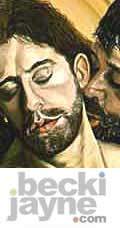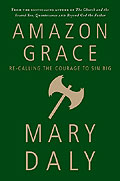 Sara Robinson tells us that within authoritarian leadership:
Sara Robinson tells us that within authoritarian leadership:
...schisms are so frequent as to be almost comic. Jealousy between leaders runs high, egos are prickly, tempers volatile, emotional intelligence not much in evidence. The more followers they get, the less stable alliances become. This internal instability is predictable...Sara's analysis explains Kristol's criticism within the blood-thirsty neocon camp and his potshots at Rumsfeld. Under the weight of the disaster in Iraq, even William F. Buckley, "the father of modern conservatism," recently characterized the war as a failure and rejected Bush's interventionist foreign policy:
"If you had a European prime minister who experienced what we've experienced it would be expected that he would retire or resign."I never thought I would agree with a quote from Buckley so Earth's missing glaciers must be on holiday in Hell. Last fall, Brent Scowcroft, Poppy Bush's personal friend and the former president's national security advisor, broke his silence to go on the record with his dissatisfaction in the Bush II Administration and the "revolutionary utopianism" of neocons in power. From Jane Hamsher I learned that Scowcroft had publicly called Junior a buffoon. Most of the right-wing rhetoric has centered around Bush, his failures, and that's plenty to wag about. But what of the legislative branch, the rubber-stamp Republicans who have followed the Bush WH in lockstep as if they had enlisted in a partisan army?
A new book, Broken Branch, co-authored by Thomas Mann and Norman Ornstein, reverberates with the clanging of an alarm bell. Congress is broken. Very broken. Dysfunctional and ineffective. Admittedly, I don't know Norman Ornstein to assume if he has been a leading contender in the con-apparatchiki but I tag him as part of the conservative wing that's awake, e.g., Kevin Phillips and John Dean. My reservation is that Ornstein hails from the American Enterprise Institute, a GOP spin tank. His cohort, Thomas Mann, comes from the Brookings Institution as a scholar of Governance Studies and may best be described as centrist. Alan Wolfe at WaMo distinguished both as "fair-minded." To his credit, Ornstein joined former Reagan deputy attorney general Bruce Fein in portraying Bush's NSA wiretapping program as an impeachable offense. Perhaps he's migrated out of the swamp of Republican radicalism if ever he were stuck in its mire. I dunno. One thing for certain, Mann and Ornstein excoriate the Republican-dominated Congress among others. A CNN interview with Ornstein and Mann (with emphasis):
PILGRIM: You know, I think we have a quote from the book that really sums up a lot. And let's take a look at it. In your book you say, "Congress has had its ups and downs in realizing the intentions of the framers. Sadly, today it is down, very much the broken branch of government."
Now, how is this Congress failing the American public?
NORMAN ORNSTEIN, AUTHOR: Well, it's failing it in a lot of ways. One is in the process. The regular order is something we call the kind of web of rules and norms that govern any institution. Now they're stretched beyond belief. Votes that are supposed to take 15 minutes take three hours. There's no sense of bringing a bill to the floor after people have taken a look at it, 1,000, 2,000-page bills come up in the middle of the night [under the Vampire Congress] with nobody having examined them beforehand.
There's no oversight of what the executive branch does. And bad process in this case leads to bad policy, whether it's the Medicare prescription drug bill, the bankruptcy bill, or the Congress operates in protecting Americans in a variety of places.
PILGRIM: It does on occasion seem quite chaotic. Why is this? Why suddenly?
MANN: Well, it didn't develop overnight. The seeds of the problems of the broken branch were planted decades ago. Certainly near the end of the democratic reign in the House, many of these same problems were emerging, but they took on a sort of special form when we had the first united Republican government since Dwight Eisenhower.
The focus was on passing the president's program and nothing else mattered. So the major leaders in Congress saw themselves as lieutenants of the president, not as custodians of the first branch of government, the lynch pin of American democracy, and so they didn't look out for how that process ought to operate, how they ought to stand up to the executive.
PILGRIM: So we can clearly blame our elected officials for not representing the American people?
ORNSTEIN: You can certainly blame them, you bet. This is not a way to operate. And what Congress has done is to in this year in particular, we have the smallest number of days in session. Every day on this show you talk about the important problems facing this country: the squeeze on the middle class, immigration. We've got Iraq, we have the war in the Middle East. Less than 100 days in session out of the 365. Here in most of those days for only a couple of hours, they don't do deliberation. They don't do debate. They're not addressing the policies that matter for the country.
PILGRIM: You know, it's -- what should the American public do? They can't just throw up their hands and say what can you do with these people, can they?
MANN: Well, it all begins with the American voters because we can talk about rules changes, procedural changes in Congress and we have a lot to suggest. But in order to get the attention of the leaders in Congress and the members, you have to have a public that's energized, that's angry, that threatens to throw the rascals out if they don't act in a responsible and accountable fashion.
It all has to start with the voters. But it's not just this populist attack on the institution. We love the Congress. It is an institution we've admired for years. We need the public to be nuanced to say, "We don't want you back here all the time campaigning or raising money. We want to you spend some time doing serious work. Talk about policy and grapple with these problems. Don't engage in these games with us."
PILGRIM: Well you certainly have spent enough time looking at the system to know that some shifting could be done in terms of rules. Is there anything that you can suggest?
ORNSTEIN: Well, there are a lot of things. We need ethics and lobbying reform desperately. And Congress has just given the back of the hand to that. We need to have a series of clear rules when it comes to earmarks, which have just careened out of control and frankly create a corrupting atmosphere, waste an enormous amount of money and don't set priorities.
Even starting with disclosure of who is sponsoring these things and where the money is going and even resistance to that. We've got to get back to doing some oversight. But just as much as we need these kinds of rules, reforms, we have got to have members of Congress who will say that we're going to abide by the rules that we have. Frankly, we need a press corps that is even more vigilant that holds them to account, their feet to the fire. We haven't had as much as we need, in the last few years.
PILGRIM: Do you believe that's true that the press has not done their job?
MANN: I think that's right. Listen, local reporters in some cases have done quite a good job. Look at those in California who uncovered Randy "Duke" Cunningham's real estate transactions. Just looking at the core real estate documents back home, which set in motion a whole series of further investigations.
So the press needs to be tough, not just scandal-mongering, but holding Congress to account to see that it runs and conducts its own business in a way that's faithful to its rules and to the grand design of the framers of our constitution to have this really be the core of our democratic system.
ORNSTEIN: Kitty, the most important point here is this is not just something for wonks like us who have been immersed in Congress for a very long time. This is of vital interest to every American. Every day there are policies that shape our lives. For older people who have to go and get pharmaceuticals, for people who are concerned about the borders, for issues whether we're actually going to be able to deal with Iraq, for the spending that we do, all of us are affected. And if Congress doesn't operate, if it's dysfunctional, as it is now, deeply dysfunctional, then it is not just something that affects the two of us. It affects everybody.Tell us something the liberal Netroots hasn't already articulated. Welcome aboard the blogofascist bandwagon. Better late than never, I suppose, although the book releases at an opportune time as we head toward the midterm elections.
So let me sum up. Voters must throw the bums out and remain involved in political life. Check. Effective ethics and meaningful lobby reform. Check. Oversight and accountability. Check. Respect the separation of powers and quit kowtowing to the executive branch. Exclamation point! Replace the lapdog press with pitbull publishers. Uh-hm. Now what's missing? I can't quite scratch the itch in my brain. But it's something important. Hmmm. Anyone?























|